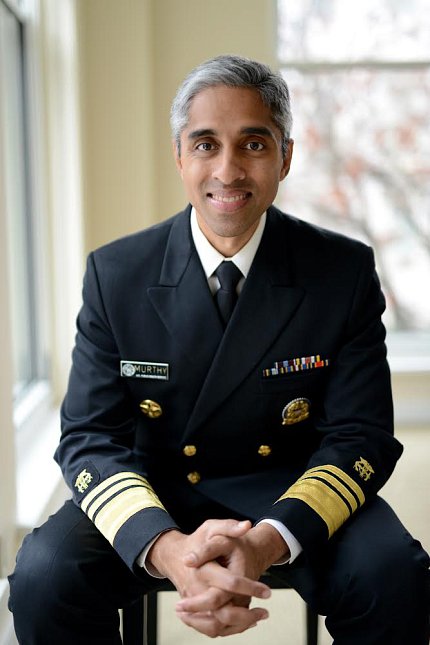BELONGING IMPORTANT FOR HEALTH
How Developing Community Connections Can Enhance Wellbeing

Creating opportunities for people to build healthy relationships with each other can combat the epidemic of isolation and loneliness, said Dr. Hahrie Han, professor and inaugural director of the Stavros Niarchos Foundation Agora Institute at Johns Hopkins University.
“We live in a world where people tend to have lots of interactions but fewer relationships,” said Han, during a fireside chat with U.S. Surgeon General Dr. Vivek Murthy. Moderated by National Institute on Minority Health and Health Disparities Deputy Director Dr. Monica Webb Hooper, the chat was part of the Murthy Distinguished Lecture Series on Public Health Leadership. Dr. Rina Das, president of the Federal Asian Pacific American Council (FAPAC) NIH chapter, and Dr. Michael Chiang, National Eye Institute director, gave opening remarks.
The civic institutions where people used to go to build relationships, such as faith communities or hobby and recreational organizations, have decayed over the past 50, 60 or 70 years, Han said.
Loneliness and isolation severely impacted the social development of many children during the Covid-19 pandemic. Most people spend their time online, which limits their ability to build relationships. However, people are having more interactions than ever before.
“During my day, I have interactions with lots of people, “ Han said. “Online, I might read a post and like it. I might also talk to the checker at the grocery store.”
Han’s research focuses on the study of organizing, movements, collective action, civic engagement, and democracy.
Relationships differ from interactions. In a relationship, both parties have expectations of a shared future. There are two types of relationships: transactional and social, she said.
In a transactional relationship, both parties have a shared future, but each person protects their self-interest. Social relationships, on the other hand, can be more fulfilling because people invest into these relationships “without knowing what they’re going to get back.”
Because there are so many opportunities to have social interactions in digital communities, they encourage what social scientists call the “habit of exit.”

If a person gets uncomfortable in an online situation or heated conversation, they can leave and find another community. Once a person develops that habit, he or she doesn’t learn a set of skills that are necessary for long-term connection. They don’t learn how to work through conflict. People behave differently if they know they aren’t leaving when things get too hard.
Young people struggle with loneliness and isolation, said Murthy. Although they stay in touch with each other through social media, they do not always have relationships with each other. Instead, they compare themselves to their peers, which leads to lower self-esteem. They also report being less comfortable in situations that require interacting with strangers.
“We have to build social muscles,” agreed Han. “We’ve lost the proverbial gyms where people would go and learn how to engage in these kinds of activities.”
People must have the opportunity to organize their lives around the things they hold sacred, she added. Young people aren’t given opportunities to learn how to live together. They feel society encourages them to prioritize their careers over relationships.
Governments around the country are starting to fund programs that address loneliness and isolation, said Murthy. They are investing in research and supporting initiatives that help communities cultivate healthy relationships.
Schools, for instance, are teaching students how to recognize, understand and manage their emotions to they can build relationships with others. Building social connections is just as important as math and reading, he argued.
“These kinds of programs are really important,” said Murthy. “We can’t assume young people are going to grow up with a strong skillset when it comes to navigating, building and maintaining relationships and negotiating conflict.”
Evangelical megachurches, or houses of worship with more than 2,000 congregants, are one of the few social institutions that have been growing. The average megachurch grew 34 percent between 2015-2020. Han said some of these churches have a motto, “belonging comes before belief.” In other words, being part of a community doesn’t depend on what a person believes.
“They create a community of belonging, which is how I think they draw people in,” she said. “People are hungry for places like that.”
People who don’t feel like they belong anywhere are in a state of hypervigilance. Those who are alone respond differently to threats. Murthy believes the rise in mental health challenges is connected to loneliness and isolation.
“Rebuilding connection is not just a health issue,” he concluded. “It’s an economic, educational and national security issue. It’s important for the health and wellbeing of society.”
Held during 2024 Asian American, Native Hawaiian, and Pacific Islander (AA NHPI) Heritage Month, the lecture honors a public health leader whose sustained efforts have profoundly advanced the field. The FAPAC NIH chapter and NIMHD organized the series.
It was co-sponsored by HHS Office of Equal Employment Opportunity, Diversity & Inclusion, Health Resources and Services Administration AANHPI employee resource group, NIH Office of Equity, Diversity, and Inclusion, Food and Drug Administration’s FAPAC chapter, Public Health Service Asian Pacific American Officers Committee, the Association of Asian/Pacific Islander Employees of the Centers for Disease Control and Preventions/ Agency for Toxic Substances and Disease Registry , and the Substance Abuse and Mental Health Services Administrations (SAMHSA) Office of Behavioral Health Equity.
The full lecture can be viewed on demand at https://videocast.nih.gov/watch=54661.
